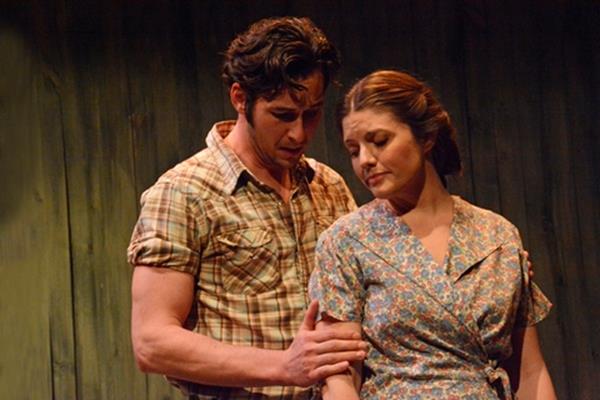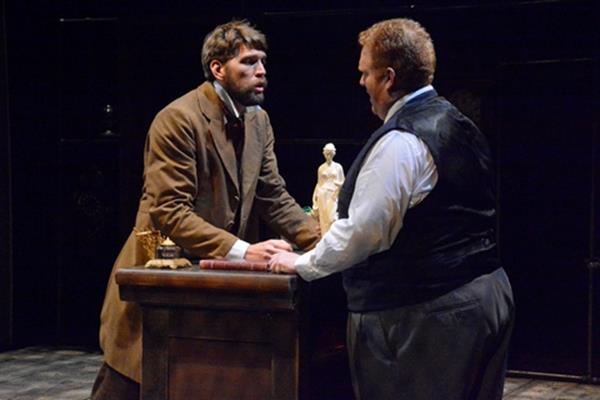Slow Dusk & Markheim
The Little Opera of NY presents two interesting mid-century one-acts by Carlisle Floyd.

Bray Wilkins and Sarah Beckham-Turner in a scene from “Slow Dusk” (Photo credit: Tina Buckman)
[avatar user=”Eric Grunin” size=”96″ align=”left” ] Eric Grunin, Critic[/avatar] Two one-act operas by Carlisle Floyd are being presented by The Little Opera Theater of NY, newly arranged for chamber orchestra. One is a very early work, the other is mature, and for those who are interested in the material this is a worthwhile presentation of music you’re unlikely to encounter elsewhere anytime soon.
Floyd is now 88, and his eleven operas demonstrate his commitment to the form even as it was sidelined, first by amplification and then by television. He achieved some prominence with Susannah (1953-54), still the work for which he is best known, and many of his subsequent efforts were presented in their turn by New York City Opera. Not by the Metropolitan, however, which has only belatedly stage Susannah, mounted in 1999 for Renée Fleming. Presumably his conservative style may makes him accessible also makes him easy to overlook. (He habitually supplies his own librettos, and some are quite good.)
Slow Dusk is the first of the operas presented. It’s Floyd’s first opera, premiered in 1949 when he was just twenty-three. It opens on a May afternoon, on a poor farm in the sandhills of the Carolinas, where seventeen-year-old Sadie (Sarah Beckham-Turner) lives with Aunt Sue (Jennifer Roderer) and brother Jess (Alexander Charles Boyd). Sadie’s soon to graduate from high school, the first in her family to do so, and has fallen in love with local boy Micah Hatfield (Bray Wilkins). Aunt Sue and Jess oppose the match, partly on the grounds of Micah’s being uneducated, but even more that his family belongs to the Truelights religious sect, rather than their own Disciples. The action ends abruptly after a deus ex machina; but perhaps Floyd was more interested at that point in writing Sadie a big vocalise and aria than creating a satisfying dramatic structure.
Floyd called this a “musical play,” and that’s a fair description, as it’s long on recitations and short on repetition. As a first effort, it’s the work of a talented student without much stage experience: everything moves a bit slowly (the orchestral introduction alone is a full five minutes), and there are too many moments where the singers are left to fill the time. Fortunately the direction by Philip Shneidman is good enough that that one doesn’t mind much. As for the voices, Wilkins in particular has a lively yet focused sound that’s a good match for the material. Beckham-Turner’s sound is bigger, but at full power her vibrato is too wide for this semi-chromatic, semi-parlando music. (It would be interesting to hear her as Donna Anna.) Ms. Roderer and Mr. Boyd were fine in thankless parts.
The new chamber orchestra reduction by Inessa Zaretsky seemed bland, but it’s plausible that the original gave her few opportunities for textural variety. It’s likely the occasional unidiomatic wind writing may be the composer’s, but in any case a line played by two solo strings in unison will almost always sound out-of-tune, even with the best players. (The standard advice is to give it to three or one, never to two.)
The second half of the bill, Markheim, was written in 1966 as a vehicle for Norman Treigle, the great bass-baritone who first came to general attention in the aforementioned City Opera production of Susannah. Based on a short story by Robert Louis Stevenson, it tells the tale of Markheim (Jeremy Milner), a dissolute aristocrat who’s desperate for money to pay off his gambling debts.
It’s Christmas Eve, 1880, and we’re in the London pawnshop of Josiah Creach (Scott Six). He chases off some carolers (played by the cast of Slow Dusk), who are essentially begging for alms. Markheim enters with a parcel he’s come to pawn, Creach evades this and makes small talk. His maid Tess (Marie Masters) appears from the back room, Markheim flirts with her boldly, she is flattered and embarrassed and departs.

Jeremy Milner and Scott Six in a scene from “Markheim” (Photo credit: Tina Buckman)
Then things get serious. Markheim explains that there are men in the street waiting to kill him for his debts, and he’s brought something valuable to pawn. Creach responds by taunting him with enumerations of his misdeeds (blackmail and the ruination of women, mostly), and ultimately denies him, refusing to fence stolen goods. Infuriated, Markheim kills him and begins to search the premises for cash, but then a supernatural visitor (Marc Schreiner) shows up, informing Markheim that Tess has left a package and is about to come retrieve it. Markheim can’t flee, so what will happen when Tess appears and finds Creach dead? The Stranger suggests a second murder, but Markheim recoils. What to do?
This opera is far more accomplished than Slow Dusk; mere seconds into the orchestral introduction you know you’re in good hands. The situation that follows is dramatic, the pacing is brisk, and the voices are shown to advantage while sensitive text-setting keeps the words intelligible.
All the performers were strong and well-cast. The part of Markheim is lengthy and often lies low, but Milner carried it off without strain. Six’s high notes were bright and strong without being too piercing for the small venue. Schreiner’s sardonic characterization and relaxed yet powerful delivery made a big impression in a small part. Masters was given little to do, but she did it with good cheer.
In spite of the “Twilight Zone” aspect of the plot, this isn’t the modern O’Henry type of short story with a twist ending; it’s the old-fashioned kind, where Markheim is faced with a decision, makes it, and must deal with the consequences. It’s verbose rather than naturalistic, again in the 19th Century manner, and this keeps it from being fully involving, at least to these 21st Century tastes. The time did pass enjoyably, however: Markheim‘s hour seemed to pass at least as quickly as the forty minutes of Slow Dusk.
Floyd’s original orchestration for Markheim is colorful and fluent, with lots of percussion, and arranger Raymond J. Lustig has managed to keep a lot of that. During the performance, I heard a woodblock but saw the percussionist was otherwise engaged. Where was it coming from? Eventually I realized it had cleverly been given to the second viola (though she did look like she’d rather be fiddling).
The orchestra, conducted by Richard Cordova, generally sounded well and never overpowered the singers. All the winds had prominent solos, but oboist Slava Znatchenii and bassoonist Gil Dejean were notably strong and expressive. (Both arrangements omitted clarinet, a very odd choice.) The one problem, as usual, was the lack of a good place to put the band. Here they were split onto either side of the playing area (strings stage right, winds and percussion stage left), and there were moments–though not many, fortunately–when the two sides plainly couldn’t hear each other.
The sets by Neil Patel made the best of a tiny playing space. The costumes by Lara de Bruijn were delightful in Markheim, though one would have expected the carolers to look a bit shabbier (in keeping with the text) and the dirt-poor farmers of Slow Dusk to look at least a little threadbare.
Vocal preparation seemed good, though the carolers in Markheim sounded as if they’d had one hot toddy too many. Two casts are alternating, full details are available at http://www.lotny.org/upcoming/.
Slow Dusk & Markheim (December 5 – 14, 2014)
The Little Opera Theatre of New York
59E59 Theaters, 59 East 59th Street, in Manhattan
For tickets, call 212-279-4200 or visit http://www.59E59.com
Running time: two hours, one intermission






Leave a comment